新概念第一册第67与71课重点及语法
新概念英语第1册第67-68课重点语法

第67-68课的内容: ⼀、重要句型或语法 1、⼀般过去时 表⽰过去发⽣的⽽现在已经结束的动作或状态。
本课主要学习的是系动词be的过去式,即was/were的⽤法。
如:I was at the geengrocer's. / Were you at the butcher's? 2、the+店主名称+'s the+店主名称+'s,⽤来表⽰商店,如:the greengrocer's,果蔬店;the butcher's,⾁店。
⼆、课⽂主要语⾔点 Were you at the butcher's? Yes, I was. 可对was/were的肯定句、否定句和⼀般疑问句进⾏操练。
学⽣程度好的话,可进⾏划线部分提问,即操练特殊疑问句。
How's Jimmy today? He's very well, thank you. How's sb.?,⽤来询问某⼈的⾝体状况或近况。
well作为形容词,主要⽤来表⽰⼈的⾝体不错。
Was he absent from school last week? 1)be absent from,表⽰缺席、缺勤。
可介绍absent的名词absence。
2)last week,表⽰上周。
last⽤来表⽰过去的时间,是⼀般过去时的标志性时间状语。
考虑到在71-72课以及第75-76课⾥会专门学习过去时间的表达,在此不宜做过多过去时间的知识拓展。
He was absent on Monday, Tuesday, Wednesday and Thursday. 介词on后接具体⽇期或星期,即具体哪⼀天⽤on。
How are you all keeping? 相当于How are you?,⽤来询问对⽅⾝体状况。
We're going to spend three days in the country. 1)此处的can表⽰许可。
新概念英语67课讲义资料讲解

新概念英语67课讲义Lesson 67 the weekend 周末一、单词与短语greengrocer: n.蔬菜水果零售商;absent:adj.缺席的,重要短语:be absent from:缺席、、、、He was absent from school last week.上周他没上学。
keep: v.(身体健康)处于(状况),保持、、、keep doing sth:一直做、、、或者是不停地做、、、、;keep knocking the door:一直敲门;spend:v.度过;spend a weekend:度周末;weekend:v.周末;country:n.国家;乡村;lucky: adj.幸运的;luck:n.幸运,机遇。
Monday:n,星期一;Tuesday:n.星期二;Wednesday:n.星期三;Thursday:n.星期四;Friday: n.星期五;Saturday: n.星期六;Sunday: n.星期日;在星期几前边一般加介词on,如:on Monday:在周一;On Sunday:在周日;二、短语、句型与语法1、Were you at the butcher′s?刚才您在肉店里吗?Yes, I was. 是的,我在。
在本句中,需要注意的一个知识点:在英文表示某一种商店的短语中,shop这个词往往可以省略,如文中的the butcher′s 其实就是the butcher′s shop的省略,另外像文中的the greengrocer′s 其实就是 the greengrocer′s shop 的省略,另外的例子还有the hairdresse r′s (shop )等等,shop 的省略不影响句义,就是一种表达的习惯。
2、how is jimmy today?吉米今天怎么样?在本句中我们继续复习关于询问人或事物状况的几个重要的句型:How is/are+主语、、、怎么样?例:How are you today?你今天可好?How is Tom today?汤姆今天可好?另外What is the matter with、、、?经常用来询问人和事物的状况,常作“是否有问题”“是否有麻烦讲”例如:What is the matter with Tom?汤姆怎么了啊?What is the matter with this bike?这辆自行车怎么了啊?What is the matter with the book?这本书怎么了?3、Was he absent from school last week?上周他没上学吧?在本句中需要掌握一个重点短语的用法:be absent from:缺席、、、例:He is absent from the meeting since he is ill.他今天缺席会议是因为他病了。
新概念英语第1册第71-72课重点语法
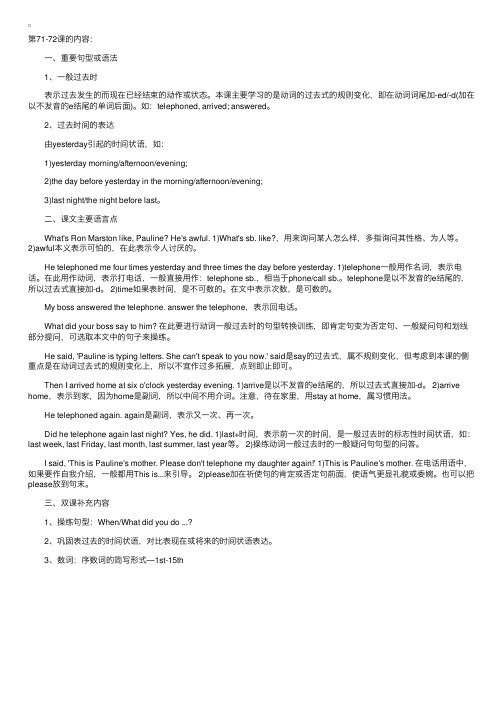
第71-72课的内容: ⼀、重要句型或语法 1、⼀般过去时 表⽰过去发⽣的⽽现在已经结束的动作或状态。
本课主要学习的是动词的过去式的规则变化,即在动词词尾加-ed/-d(加在以不发⾳的e结尾的单词后⾯)。
如:telephoned, arrived; answered。
2、过去时间的表达 由yesterday引起的时间状语,如: 1)yesterday morning/afternoon/evening; 2)the day before yesterday in the morning/afternoon/evening; 3)last night/the night before last。
⼆、课⽂主要语⾔点 What's Ron Marston like, Pauline? He's awful. 1)What's sb. like?,⽤来询问某⼈怎么样,多指询问其性格、为⼈等。
2)awful本义表⽰可怕的,在此表⽰令⼈讨厌的。
He telephoned me four times yesterday and three times the day before yesterday. 1)telephone⼀般⽤作名词,表⽰电话。
在此⽤作动词,表⽰打电话,⼀般直接⽤作:telephone sb.,相当于phone/call sb.。
telephone是以不发⾳的e结尾的,所以过去式直接加-d。
2)time如果表时间,是不可数的。
在⽂中表⽰次数,是可数的。
My boss answered the telephone. answer the telephone,表⽰回电话。
What did your boss say to him? 在此要进⾏动词⼀般过去时的句型转换训练,即肯定句变为否定句、⼀般疑问句和划线部分提问,可选取本⽂中的句⼦来操练。
He said, 'Pauline is typing letters. She can't speak to you now.' said是say的过去式,属不规则变化,但考虑到本课的侧重点是在动词过去式的规则变化上,所以不宜作过多拓展,点到即⽌即可。
新概念英语第一册语法综述 67-72

新概念英语第一册语法综述(LESSON67-LESSON72)Part 11、At the butcher’s在肉店,参考Lession14的注释,对映的名词有:greengrocer’s(蔬果店)doctor’s(诊所)my mother’s(我妈妈的家)hairdresser’s(理发店)2、How are you all keeping? 你们身体都好么?3、for the weekend for强调一个时间段;at强调一个时间点4、Aren’t you lucky! 你们真幸运!否定形式的感叹句。
Don’t you know! 你难道不知道么?Isn’t he my friend! 难道你不是我的朋友么?5、at church 做礼拜。
注意以下不用不定冠词:church、school、hospital。
in the race 参加比赛at the race 在赛场上(观看比赛)6、hundreds of…数以百计的…用来表示不确定的数量才用复数形式。
Five other cars were just behind him. 注意程度副词just的位置,在be动词之后。
7、一般过去时:表示过去发生的动作、事件。
与一般过去时连用的时间状语有:1. 句子中有“介词+表示过去时间的名词”构成的短语,如in 1949,on March fifth等时。
例如:Tom was born in 1990. 汤姆出生于1990年。
2. 句子中有表示时间的副词yesterday,或由yesterday构成的短语,如yesterday morning/ afternoon/ evening,the day before yesterday等时。
例如:He went to Beijing with his parents yesterday. 他昨天和他的父母一起去北京了。
3. 句子中有“时间段+ago”构成的短语,如five days ago,two years ago等时。
新概念英语第1册第69-70课重点语法

新概念英语第1册第69-70课重点语法新概念英语第1册第69-70课重点语法第69-70课的内容:一、重要句型或语法1、普通过去时表示过去发生的而现在已经结束的动作或状态。
本课主要学习的是There was/There were的用法,如:In 1995, there was a very big race. / There were hundreds of people there.2、介词:各种时光的表达1)in:普通后接月,份、季度和年份,如:in May, in summer, in 2022。
也会用于某些短语,如:in themorning/afternoon/evening。
2)on:普通后接详细日期或星期,表示详细哪一天。
如:on July 1st, 1921/on Saturday。
3)at:普通后接详细时刻,表示几点几分。
如:at 7o'clock/at 7:35。
二、课文主要语言点There is a car race near our town every year.1)可复习there is/are和普通现在时的用法。
2)race普通表示竞速类的竞赛。
注重区别race与match(球类运动竞赛等)。
There were hundreds of people there. hundreds of表示成百上千、数以百计,是一种概数。
假如要表达确定的数字,普通用作:基数词+hundred+名词,如:five hundred students,注重hundred 不能用复数,也不能再后接of。
My wife and I were at the race. be at the race,表示在比赛现场、观察竞赛。
Our friends Julie and Jack were there, too. Julie and Jack作为myfriends的同位语,补充说明我的伴侣叫什么名字。
新概念第一册课文翻译及知识点【Lesson67、69、71】

【导语】新概念英语作为⼀套世界闻名的英语教程,以其全新的教学理念,有趣的课⽂内容和全⾯的技能训练,深受⼴⼤英语学习者的欢迎和喜爱。
为了⽅便同学们的学习,⽆忧考为⼤家整理了⾯的新概念第⼀册课⽂翻译及学习笔记,希望为⼤家的新概念英语学习提供帮助!Lesson67 【课⽂】 MRS.JOHNSON: Hello. Were you at the butcher's? MRS.WILLIAMS:Yes. I was. Were you at butcher's, too? MRS.JOHNSON: No, I wasn't. I was at the greengrocer's. How's Jimmy today? MRS.WILLIAMS:He's very well, thank you. MRS.JOHNSON: Was he absent from school last week? MRS.WILLIAMS:Yes, he was. He was absent on Monday, Tuesday, Wednesday and Thursday. How are you all keeping? MRS.JOHNSON: Very well, thank you. We're going to spend three days in the country. We're going to stay at my mother's for the weekend. MRS.WILLIAMS:Friday, Saturday and Sunday in the country! Aren't you lucky! 【课⽂翻译】 约翰逊夫⼈:您好。
刚才您在⾁店⾥吗? 威廉斯夫⼈:是的,我在⾁店⾥。
您也在⾁店⾥吗? 约翰逊夫⼈:不,我不是。
新概念第一册各课语法项目
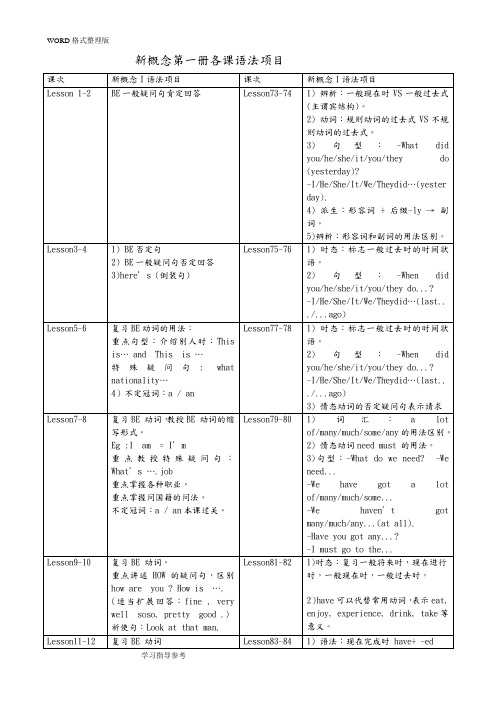
新概念第一册各课语法项目课次新概念I语法项目课次新概念I语法项目Lesson 1-2 BE一般疑问句肯定回答Lesson73-74 1) 辨析:一般现在时VS一般过去式(主谓宾结构)。
2) 动词:规则动词的过去式VS不规则动词的过去式。
3) 句型:-What didyou/he/she/it/you/they do(yesterday)?-I/He/She/It/We/Theydid…(yesterday).4) 派生:形容词 + 后缀-ly → 副词。
5)辨析:形容词和副词的用法区别。
Lesson3-4 1) BE否定句2) BE一般疑问句否定回答3)here’s (倒装句) Lesson75-76 1) 时态:标志一般过去时的时间状语。
2) 句型:-When didyou/he/she/it/you/they do...?-I/He/She/It/We/Theydid…(last.../...ago)Lesson5-6 复习BE动词的用法:重点句型:介绍别人时:Thisis… and This is …特殊疑问句: whatnationality…4)不定冠词:a / an Lesson77-78 1) 时态:标志一般过去时的时间状语。
2) 句型:-When didyou/he/she/it/you/they do...?-I/He/She/It/We/Theydid…(last.../...ago)3) 情态动词的否定疑问句表示请求Lesson7-8 复习BE 动词,教授BE 动词的缩写形式。
Eg :I am = I’m重点教授特殊疑问句:What’s ….job重点掌握各种职业。
重点掌握问国籍的问法。
不定冠词:a / an本课过关。
Lesson79-80 1) 词汇: a lotof/many/much/some/any的用法区别。
2) 情态动词need must 的用法。
3)句型:-What do we need? -Weneed...-We have got a lotof/many/much/some...-We haven’t gotmany/much/any...(at all).-Have you got any...?-I must go to the...Lesson9-10 复习BE 动词。
新概念英语第一册第67课

She talked in the library.
2
She didn’t talk in the library.
3
Did she talk in the library?
4
Yes,she did. No,she didn't.
5
What did she do?
6
He made a noise.
yesterday,tomorrow,last,
next,this,that等限定词来修饰morning/afternoon/evening/spring/winter等词时,前面不加任何介词
yesterday,tomorrow,today,tonight单独使用时,前面不能加任何介词
规则变化的动词过去式
greengrocer n. 蔬菜水果零售商
be absent from…… 不在……,缺席…… be absent from school 缺课 be absent from work 旷工 她不喜欢上学,所以她经常缺课。 She doesn’t like school, so she is often absent from school.
一般过去时练习 我给医生打电话了。
He called the doctor.
He didn’t call the doctor.
Did he call the doctor?
Yes, he did. No, he didn't.
What did he do?
3
2
1
4
5
一般过去时练习
*
我们在图书馆说话了。
星期六, 7月7日 Saturday, July 7th 星期一, 9月9日 Monday, September 9th 周日, 8月8日 Sunday, August 8th 星期二, 10月10日 Tuesday, October 10th.
新概念英语第一册Lesson71-72笔记(语法点+配套练习+答案)
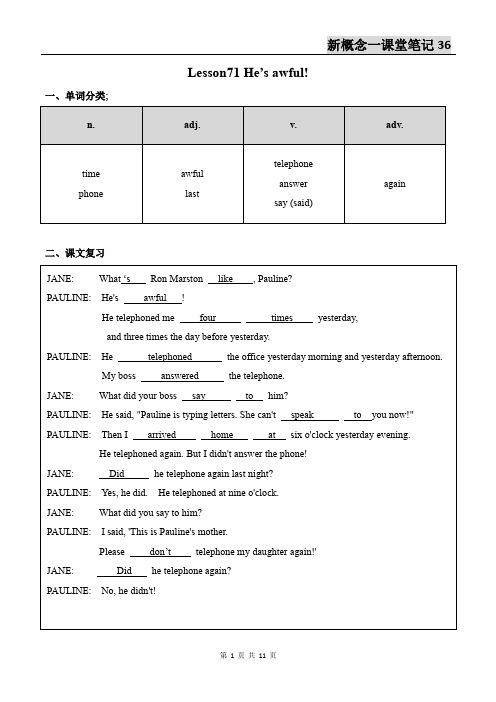
9.Where did you go yesterday?
10.Helen arrived home late last night.
3.动词过去式的变化规则
1直接加ed
2哑音e结尾,加d
3辅元辅,闭音节,双写词尾辅音加ed
4辅音+y结尾,变y为i加ed
练习一:变过去式
again adv.再,又
Please say it again.请再说一遍。
See you again.下次再见。
What's ... like ?...怎么样?
=How is ... ?
What’s your new teacher like? ( B )
A.He is happy.
B.He is tall and kind.
4.Our teacher went to the hospital yesterday.
5.They are going to the restaurant together.
6.Mr.Black often ran around the park last year.
7.There was a book on the floor just now.
Rememberto telephonethe doctor when you fee ill.
生病的时候记得给医生打电话。
Can I use your mobile phone please?
I wantto make a telephone call.
我可以用你的手机吗?我想打一个电话。
time n.
今夜
tonight
新概念英语第一册71课

注 意 实义动词变过去式的构成 做 2.实义动词的不规则变化: 笔 不规则动词:do-did 记 have-had 哦! say-said go-went take-took put-put
本课重点语法
do the exercise about past form
air---- aired snow--- snowed
answered the telephone. My mother __________ 扩展知识:answer 还有回答的意思 answer Could you please _________ my question. answer 也可作为名词,是答案的意思。 answer This is the _________ to the question. 这是问题的答案。
• telephone sb. =call sb.(up) 给某人打电话 He has a toothache, so he must _________ telephone the dentist.
telephone ['telifəun] =phone n.电话 v.打电话
time [taim] n.次数
listen--- listened boil--- boiled arrive---- arrived play--- played enjoy----enjoyed shave---shaved call--- called empty---emptied stop---stopped
Listen and answer
肯定回答: Yes, he did
否定回答: No,he didn’t=No, he did not. 特殊疑问句:特殊疑问词+一般疑问句 What did he do yesterday morning?
新概念英语第一册1_72课语法点总结
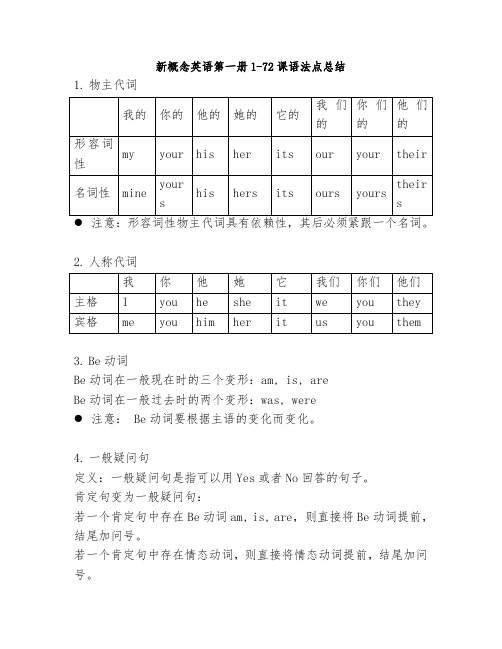
新概念英语第一册1-72课语法点总结1.物主代词2.人称代词3.Be动词Be动词在一般现在时的三个变形:am, is, areBe动词在一般过去时的两个变形:was, were●注意: Be动词要根据主语的变化而变化。
4.一般疑问句定义:一般疑问句是指可以用Yes或者No回答的句子。
肯定句变为一般疑问句:若一个肯定句中存在Be动词am, is, are,则直接将Be动词提前,结尾加问号。
若一个肯定句中存在情态动词,则直接将情态动词提前,结尾加问号。
若一个肯定句中存在实义动词,则直接在句首加助动词do/does/did,实义动词变原形,结尾加问号。
注意:一般疑问句一般读为升调。
例:Are you a teacher? 你是一名老师吗?肯定回答:Yes, I am. 否定回答:No, I am not.Do you like English? 你喜欢英语吗?肯定回答:Yes, I do. 否定回答:No, I don’t.5.特殊疑问句定义:不能用Yes或者No回答的句子。
构成:特殊疑问词 + 一般疑问句特殊疑问词:what(什么), when(何时), where(何地), who (谁), whom(谁宾格), whose(谁的), which(哪个), why (为什么), how(怎么样)口诀:非常八加一6.不定冠词a/an若单词是以“a, e, i, o”四个元音开头,其前面选用“an”;若单词是以元音字母“u”开头,视情况而定。
若其发音与“umbrella”中的“u”一致,则前面加“an”;若其发音与“university”中的“u”一致(即发字母本身音时),前面加“a”。
若单词是以辅音字母开头,一般前面用a。
特殊:an hour 一个小时;an honest boy 一个诚实的男孩若一个字母单独出现时,分如下情况:加an的字母:a, e, i, o(元音); x, r, s, l, n, f, m, h (辅音;口诀为“学而思送来那份美好”)例: There is an “m”in the word “umbrella”. 在单词umbrella里面有一个字母m。
新概念英语第一册Lesson67_72课文详注

新概念英语第一册Lesson67~72课文详注【导语】学习新概念英语并不难啊。
你还在为英语成绩低拖后腿而烦恼吗?不要着急,小编小编为大家提供了“新概念英语第一册Lesson67~72课文详注”。
相信加入学习当中的你,很快便不再受英语的困扰!还在等什么?和小编一起来学习吧!新概念英语第一册Lesson67~68课文详注1. Were you at the butcher's?刚才您在肉店里吗?at the butcher' s=at the butcher' s shop。
在英文中,表示店铺、住宅、公共机构、公共建筑物以及教堂的名字或某人家时,名词所有格后常不出现它所修饰的名词:the greengrocer' s ( shop)蔬菜水果店the hairdresser' s ( shop)理发店the stationer' s ( shop)文具店the doctor' s ( office)诊所my mother ' s ( house)我妈妈家里St . Paul ' s ( Church)圣保罗教堂2. be absent from 不在,缺席。
3. the country=the countryside 乡下。
country表示“农村”时,前面一定要加定冠词the。
新概念英语第一册Lesson69~70课文详注1.hundreds of 数以百计的。
这是用来表示不定数量的复数形式。
类似的结构还有thousands of(数以千计的),millions of(数以万计的)。
但必须注意:说five hundred(500 ) , six thousand(6000),two million(200万)等具体数字时,hundred, thousand,million这些词因为之前有具体数字而本身不加-s。
2. at the race 观看比赛。
(完整版)新概念第一册每一课重点的总结
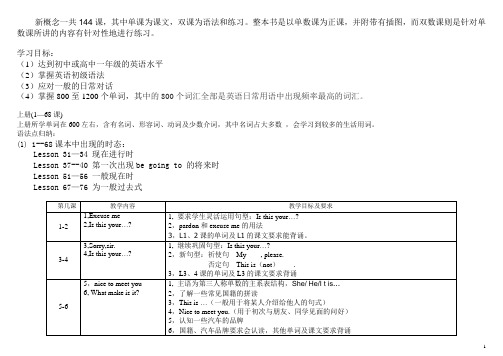
新概念一共144课,其中单课为课文,双课为语法和练习。
整本书是以单数课为正课,并附带有插图,而双数课则是针对单数课所讲的内容有针对性地进行练习。
学习目标:
(1)达到初中或高中一年级的英语水平
(2)掌握英语初级语法
(3)应对一般的日常对话
(4)掌握800至1200个单词,其中的800个词汇全部是英语日常用语中出现频率最高的词汇。
上册(1—68课)
上册所学单词在600左右,含有名词、形容词、动词及少数介词,其中名词占大多数,会学习到较多的生活用词。
语法点归纳:
(1) 1--68课本中出现的时态:
Lesson 31—34 现在进行时
Lesson 37--40 第一次出现be going to 的将来时
Lesson 51—56 一般现在时
Lesson 67—76 为一般过去式
中册(69—106课),大约有300单词,包含名词、动词、形容词、副词、介词,其中所学的动词和副词会有所增加。
课文中出现的时态有:
Lesson 67—76 为一般过去式
Lesson 83—90 为现在完成时
Lesson 91—96 为一般将来时
下册(107—144课),大约有300个单词语法点归纳:
1、L107-108形容词的比较级,最高级
2、L117-118时间状语从句和过去进行时
3、L121-122定语从句
4、L119-120 过去完成时
5、L139-140宾语从句
6、L141-144被动语态。
新概念英语第一册第67课
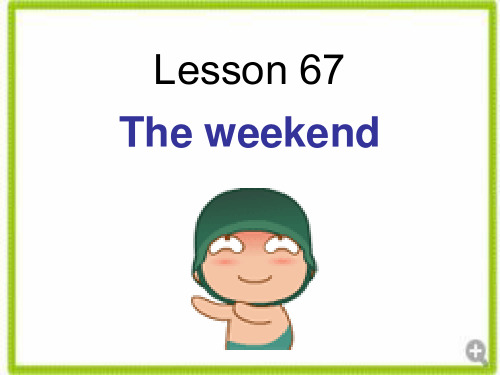
一般过去时
• 一般过去时(simple past tense)表示过去 某个时间里发生的动作或存在的状态,常 和表示过去的时间状语连用,如yesterday, last night,in 1990,two days ago等。 • 一般过去时也表示过去经常或反复发生的 动作,常和often,always等表式频率的时 间状语连用。
一般现在时
一般过去时
is , am are
→ →
was were
一般过去时结构
含有be动词(过去的状态)
肯:主语+was/were +其他. 否:主语+wasn’t/weren’t +其他. 疑:Was/Were +主语+ 其他? 答:Yes,主语+was/were. No, 主语+wasn’t / weren’t.
absent adj. 缺席的
• • • • • be absent from 上星期她没去上学吧? Was she absent from school? 我昨天没上班。 I was absent from work yesterday.
keep
v.
身体处于…状态,保持
• How are you all keeping? • How is your mother keeping? • Please keep the door open.
规则变化的动词过去式
1 直接加ed: work—worked look—looked 2 以不发音e结尾的单词,直接加d: live —lived use—used, 3 以辅音字母+y结尾的,变y为i加ed: study— studied carry—carried 4以元音字母+y结尾的,直接加ed: enjoy —enjoyed play—played 5 以重读闭音节结尾的,双写+ed: stop— stopped plan—planned
新概念英语第一册Lesson67_72语法及单词

新概念英语第一册Lesson67~72语法及单词新概念英语第一册Lesson67~68语法及单词语法Grammar in use一般过去时be( am/is/are)的过去式是was/were:在英文中,过去发生的而现在已经结束的动作要用一般过去时来表示。
be动词的过去式不规则,第1人称与第3人称单数用was,其他情况用were。
用be动词的一般现在时形式的一般疑问句及特殊疑问句迄今已介绍过,其过去时形式也一样,只是动词be在形式上变为was或were。
请看以下例句:Was Mrs.Johnson at the butcher’s?约翰逊夫人在肉店吗?No,sha wasn’t.她不在。
Were you at school or at church ou January 1st ?1月1号你在学校还是上教堂了?I wasn't at school on January 1 st .I was at church.我1月1号没上学。
我上教堂做礼拜了。
When was he absent from school ?他何时缺课了?He was absent on Monday,Tuesday,Wednesday and Thursday . 他周一、周二、周三和周四缺课了。
Where were you on Sunday ?周日你在哪儿?I was at church on Sunday.我周日在教堂做礼拜。
词汇学习Word study1. spend v.(1)花(时间等);度过:Where are the Johnsons going to spend the weekend ?约翰逊一家准备到哪儿去度这个周末?I hope that you wouldn’t spend so much time watching television.我希望你不要花这么多的时间看电视。
(2)用(钱),花费:I’m going to spend all my money this weekend !这个周末我要把我所有的钱都花掉!At present,more and more people have come to realize that more money should he spent on health and education.目前,越来越多的人已开始认识到:应该在健康和教育方面多花些钱。
新概念英语第一册Lesson71~76自学笔记精讲解析

新概念英语第一册Lesson71~76自学笔记精讲解析新概念英语第一册Lesson71~72自学笔记精讲解析1.What’s Ron Marston like, Pauline? 波琳,朗·马斯顿是怎样一个人?What is sb. like? 这一句式可用来询问某人的外貌或品行。
就本课的具体情况而言,波琳的回答更多地是指马斯顿的品行如何。
2.He telephoned me four times yesterday…他昨天给我打了4次电话……four times, 4次。
time在英语中作不可数名词时表示“时间”;作可数名词时表示“次数”。
请注意英语中次数的表示法:once 1次twice 两次three times 3次3次或3次以上通常都用基数词+ times表示:five times 5次thirty times 30次3.the day before yesterday,前天。
4.answer the telephone,接电话。
口语中也常用 answer the phone。
类似的短语如:answer the door/doorbell应声开门answer a letter回信5.She can’t speak to you now! 她现在不能同你讲话!speak to sb. 意为“与某人说话”。
例如打电话时可以说:May I speak to Pauline, please? 请让波琳接电话好吗?I’ d like to speak to Pauline, please. 我想请波琳听电话。
6.This is Pauline’s mother.我是波琳的母亲。
This is…是英美人打电话时表示“我是……”的句式,而不说I’m…。
相关的电话用语如:This is Mary speaking. 我是玛丽。
This is Edward calling from London. 我是爱德华,现正在伦敦给你打电话。
新概念英语第一册71课

新概念英语第一册71课
摘要:
一、新概念英语第一册71 课概述
二、课文内容概述
三、课文生词及短语
四、课文翻译
五、课文造句练习
六、总结
正文:
一、新概念英语第一册71 课概述
新概念英语第一册71 课,是一篇以描述人物特征为主题的英语课文。
课文以对话的形式展开,通过简和波淋的对话,展现了朗马顿的性格特点。
二、课文内容概述
简问波淋,朗马顿是怎样一个人。
波淋回答说,朗马顿很讨厌,昨天给他打了四次电话。
从对话中可以看出,朗马顿可能是一个让人感到困扰的人物。
三、课文生词及短语
1.awfully:非常地
2.telephone:打电话
3.yesterday:昨天
4.four times:四次
5.awful:讨厌的
四、课文翻译
简:波淋,朗马顿是怎样一个人?
波淋:他讨厌透了!昨天他给我打了四次电话。
五、课文造句练习
1.He"s awfully lazy.(他非常懒惰。
)
2.She telephoned me yesterday.(她昨天给我打电话。
)
3.I went to the park four times last week.(我上周去了四次公园。
)
六、总结
新概念英语第一册71 课通过简和波淋的对话,让我们了解到朗马顿的性格特点。
- 1、下载文档前请自行甄别文档内容的完整性,平台不提供额外的编辑、内容补充、找答案等附加服务。
- 2、"仅部分预览"的文档,不可在线预览部分如存在完整性等问题,可反馈申请退款(可完整预览的文档不适用该条件!)。
- 3、如文档侵犯您的权益,请联系客服反馈,我们会尽快为您处理(人工客服工作时间:9:00-18:30)。
一、单词关联及拓展
1. greengrocer n. 蔬菜水果零售商在英文中,表示店铺、住宅、公共机构、公共建筑物以及教堂的名字或某人家时,名词所有格后常不出现它所修饰
的名词:at the greengrocer's (shop) 在蔬菜水果店
at the butcher's (shop)在肉店里at the dentist's (office)在牙医的诊所at the hairdresser's (shop)在理发店at the stationer’s (shop) 在文具店 at my mother's house = at my mother's
adj. 缺席的be absent from 不在,缺席
be absent from school 缺课 be absent from work 旷工
3. keep v. (身体健康)处于(状况) keep sth. +形容词
① v. 使保持某状态;保持 keep sth. doing Keep the fire burning.
② v. 保存;保留 keep sth.
He would not be able to keep his job. 他恐怕保不住他那份工作了。
v. 度过人作主语
① v. 花(时间等);度过 spend + n./pron. 度过spend my holiday
② v. 用(钱),花费
spend 时间/金钱 + on +sth. Women spend a lot of money on clothes.
spend 时间/金钱 +(in) doing sth.
The manager spent 2 hours explaining the plan at the meeting.
n. 乡村① n. 国家;国土;故乡
② n. 乡下,乡村the country = the countryside 乡下
country表示“农村”时,前面一定要加定冠词the。
③ adj. 乡下的;乡村风味的 I prefer the country life to the life in the city.
乡村生活与城市生活相比,我更喜欢乡村生活。
二、记住下列句子
1. Were you at the butcher’s?你刚才在肉店吗? was at the greengrocer’s. 我刚才在蔬菜水果店。
3. Was he absent from school last week? 上个周他没上学吗?
4. We are going to spend three days in the country. 我们打算到乡下去呆3天。
5. Aren’t you lucky!= Lucky you! 你们真幸运呀!
助动词的否定形式加强肯定语气。
U36 Lesson 71-72
记住下列关于时间的短语
today 今天 yesterday 昨天 the day before yesterday 前天tonight 今晚 last night 昨晚 the night before last 前天晚上last week 上周 last Monday上周一 this morning 今早
yesterday morning 昨天早上 this afternoon 今天下午 yesterday afternoon 昨天下午
了解下列短语,有能力者要记住哦!
关于awful 让人讨厌的 -ful结尾的形容词
hopeful有希望的 painful使痛苦的 useful有用的 helpful有帮助的
关于telephone 打电话
telephone +名词表示与电话相关的事物
telephone book 电话本 telephone box 电话亭 telephone number 电话号码
名词+phone表示----的电话mobile phone 手提电话 smart phone 智能电话picture phone 电视电话
关于time 次数 once 一次 twice 两次 three times 三次
It’s time to do sth. 到了该做---的时间了
It’s time to go to school. 到了该上学的时间了。
It’s time for sth. 到了该---的时间了 It’s time for school. 到了上学的时间了。
关于answer the answer to the question 这个问题的答案
the key to the door这扇门的钥匙
关于一般过去时态
——————————
1———————————— 2 I am a cock.
一般过去时1. 何时用一般过去时?
1)它主要表示在某一个过去时间发生的动作或情况,其中包括习惯性动作,
通常与表示过去的时间状语连用。
如: I got up at 5 o’clock yesterday morning.
2) 叙述一个发生在过去的故事或者时间的时候,叙述的内容一般用一般过去时。
如:She went to the cinema last weekend. She met her sister there.
2. 一般过去时的构成:主语+动词的过去式
a)I was in Primary School.
b)It was sunny yesterday.
c)They were happy last night.
d) My teacher worked as a singer two years ago.
e)He won the prize last match.
f)I slept for ten hours last night.
1.如何变否定句a)I was ______ in Primary School.
b)It was ______ sunny yesterday.
c)They were ________ happy last night.
d) My teacher ______ ________ as a singer two years ago.
e)He ______ _______ the prize last match.
f)I ______ ________ for ten hours last night.
规则:先看句子中有没有was或were,有的话,变否定句在其后加not;若没有was或were,就要借用did not (didn’t),动词的过去式要还回原形。
3如何变一般疑问句及回答
a)______ _____ in Primary School ____ 肯b)______ _______ sunny yesterday ______ 否
c)_______ _______ happy last night _____ 肯
d) _____ _______teacher _______ as a singer two years ago___
e)______ _____ _____ the prize last match ______ 否
f) _____ ______ ______ for ten hours last night ____ 肯
规则:句子中若有was或were,变一般疑问句,直接将was或were 提前后面照抄不变加问号;若没有was或were,就要借用did,动词的过去式要还回原形。
口诀:一般过去时并不难,过去动作,状态记心间
动词要用过去式,时间状语句末站。
否定句很简单,didn’t站在动原前,其他部分不要变。
一般疑问句也好变,did放在句子前,主语,动原,其它部分依次站。
特殊疑问句也简单,疑问词加一般疑问句记心间。
最后一条请注意,动词过去式记心间。
4. 动词如何变过去式?
一般是在动词原形后面加-d或-ed,其规则如下
1)一般情况加–ed; 如:look-looked learn-learned
2) 以不发音的e结尾加-d;如:smile-smiled live-lived
3) 以辅音字母+y结尾,把y变i再加-ed;如hurry-hurried carry-arried
4) 以一个辅音字母结尾的重读闭音节词,双写字尾加-ed;如: pat-patted
5) 还有很多动词的过去式是不规则的。
如: go-went buy-bought
am, is –was are-were
5.一般过去时里需要注意的有
在一般过去时的句子里通常有明确的过去时间。
如该句中没有时间状语,那么上下文中一定有表明过去的时间状语或可以体现“动作或情况发生于过去”这一概念。
